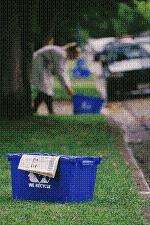- Why bother taking the time to separate stuff from the regular trash if it’s not going to actually be recycled?
- I heard nobody wants to buy any of the newsprint or plastic because it costs more to reprocess it than it does to start from scratch. Is this stuff just collecting at the dump?
These are reader comments from a recent Winnipeg recycling news story.
 Some people say that it all goes to the landfill anyway. Others worry that some of our recycling ends up being shipped to places like China or Africa. Anti-recycling, free-market fundamentalists like Property and Environment Research Center have muddied the water even further with their claims that recycling is bad for the environment and if we “ever run out of sand and oil byproducts we can mine the landfills and recycle them all at once”.
Some people say that it all goes to the landfill anyway. Others worry that some of our recycling ends up being shipped to places like China or Africa. Anti-recycling, free-market fundamentalists like Property and Environment Research Center have muddied the water even further with their claims that recycling is bad for the environment and if we “ever run out of sand and oil byproducts we can mine the landfills and recycle them all at once”.
Tell us what you think and we will include your responses when we bust the myth that recycling is not worth the bother.
Also, see what other green myths we have taken on!



Thank you for challenging our assumptions and inspiring a more thoughtful approach to our environmental efforts. Green Action Centre is not just a hub for information; it’s a catalyst for change, nudging us all to be better stewards of this beautiful planet we call home.
I don’t think it’s not worth it but it is not enough since factories are still making materials that are not renewable if only they can come up with a materials that are biodegradable or renewable then I believe it will be worth it to recycle.
Hi,
Very interesting question… As it is, it’s easy to say it’s not worth it, because no real measures are taken. There are a lot of specialized recycling centers, like electric and electronic devices recycling (e-waste). That is still not enough, it’s a collective issue, so it must be solved collectively too.
There is always room for disagreement on recycling. There’s such a wide band of materials, and so many factors influence the environmental and economic payback.
The greatest redemption for recycling is those materials that have such a strong market worth that the environmental benefit is secondary. Virtually all metals hold great value, don’t degrade with reprocessing, represent very large energy savings (versus raw materials processing), save natural resources, and don’t have to travel far for recycling. Intact domestic beer bottles have most of the same benefits – though they’re reused rather than recycled – but they’re a much different commodity.
Generally, plastics and paper recycling aren’t as easy to defend. They degrade with processing, save less energy, require more raw materials, and travel further to be processed. The price of oil undermines the worth of plastic when it is cheap, but doesn’t seem to strengthen their worth no matter how high it gets. Among plastics, only pop bottles maintain enough material value and energy savings to ride out market slumps, and supply/demand changes.
I say focus on recycling the high-worth, high-embodied energy items to nearly 100% capture before subscribing the same effort to lesser materials.
A member commented:
What I think is that an independent reliable inquiry should be done and widely published, so we know what’s really happening to our recyclables.
…and how much it really costs including all the hidden expenses.
Is recycling a waste of time?
Maybe.
There is a big question that needs looking at.
“What are we doing as a collective community to “reduce”
our waste before we recycle?
Think about what your buying.
We live in a world of so called convenience, in doing so we produce more garbage, such as individually wrapped items.
Is it really necessary?
Do we really need tetra packs of apple juice?
Why not purchase a larger bottle, then when on the go carry the juice in thermos, or any other to go item.
If possible squeeze your own juice.
We as a society need to change our attitude towards what and why we buy what we do. Be conscious what and where the item you are buying will end up.
Recycling is the last of the 3 Rs.
Reduce
Reuse
Recycle
Something so simple as taking your own traveler mug or Tupperware container to a restaurant for those to to orders, will reduce the amount of garbage you produce as an individual.
The CBC story was certainly an interesting look at recyclable plastics. Of course, there are many more materials in our blue boxes and recycling bins.
Hence the “some” in my comment.
In 1970, I volunteered at Pollution Probe for the summer in London Ontario. We did a survey on garbage and recycling. The response was mostly; give us a chance, make it easy and we will do it. Initially, there was only a market for newspaper, glass, and metal. It was picked up on the same day as garbage day and everything went along. The point is, most people will recycle, will walk when they can and will take care of their environmental health. In Winnipeg we have to be more proactive than the minimum standards. In other cities, there is a separate garbage day, recycling day and compost day. It may be less convenient but you can be sure that the consumer is more aware than your average Winnipeger. Wher my brother lives in NewJersey, the municipality can issue a fine at the curbside…. to the tune of 5000.00 dollars!
CBC already did a recent piece on recycling and what happens to some of the materials.
http://www.cbc.ca/news/canada/manitoba/story/2010/11/09/man-recycling-garbage-plastics-expo.html